Your baby is now officially an embryo and is about the size of a poppy seed.
Please visit www.nhs.uk/conditions/pregnancy-and-baby/4-weeks-pregnant/ for more information.
Local Maternity and Neonatal System
View navigation
After the birth
Exercising after pregnancy is a great way to keep and stay healthy and adapt to your body’s changes.
 Keeping active holds many benefits for you after the birth of your baby:
Keeping active holds many benefits for you after the birth of your baby:
This leaflet from the Pelvic, Obstetric and Gynaecological Physiotherapy (POGP) Group is a particularly useful resource - Fit for future – essential advice & exercises following childbirth.
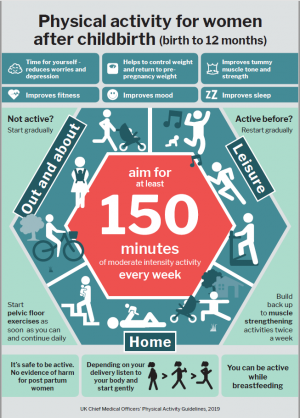 The Physical Activity Guideline infographic from the UK Chief Medical Officers' on the left can also be downloaded here.
The Physical Activity Guideline infographic from the UK Chief Medical Officers' on the left can also be downloaded here.
As soon as you feel fit and able following delivery you can begin walking small distances to keep active. It is very important to begin doing pelvic floor exercises as soon as possible and to continue to do these for the rest of your life!
It is recommended for all women to have a 6 week check with their GP and at this appointment your GP should advise you if it is safe or not to begin to do high impact activity again – Zumba, running etc. If you have had a caesarean section birth it is likely you may need a longer recovery time.
There are many mum & baby exercise classes in the area which are perfect for easing back into fitness and meeting other mum’s. These can be found at Where are we? | Mumbler Ltd .
If you are exercising following the birth of your baby and you experience feeling faint or dizzy, chest pain, headaches, muscle weakness, calf swelling or pain – STOP EXERCISING AND TAKE MEDICAL ADVICE AS APPROPRIATE.
Following having your baby, it is important to activate and strengthen your abdominal muscles to improve recovery, decrease risk of injury and relieve back pain. The abdominal muscles surround the abdomen, spine, pelvic floor muscles and the lower back muscles.

Your baby is now officially an embryo and is about the size of a poppy seed.
Please visit www.nhs.uk/conditions/pregnancy-and-baby/4-weeks-pregnant/ for more information.

Your baby is now the size of a kidney bean and weighs 1g.
Please visit www.nhs.uk/conditions/pregnancy-and-baby/8-weeks-pregnant/ for more information.
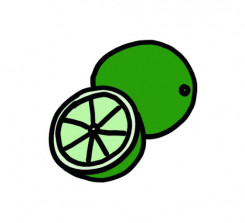
Welcome to the second trimester!
Your baby is about the size of a small lime and weighs approximately 14g.
You have hopefully seen your midwife for your 'booking in' appointment, if you have not yet seen a midwife please make an appointment quickly, so you can have all of your choices about screening tests explained and offered to you.
Please visit www.nhs.uk/conditions/pregnancy-and-baby/12-weeks-pregnant/ for more information. You can also link to the 'Pregnancy Journey' area here.

Your baby is about the size of an avocado and weighs approximately 100g.
Please visit www.nhs.uk/conditions/pregnancy-and-baby/16-weeks-pregnant/ for more information.

Your baby has grown in length and is now the length of a small banana and weighs approximately 300g. Around this time you will be offered your '20 week' scan, also known as the 'anatomy' or 'anomaly' scan.Click here for more information about screening.
This is a also a good time to talk and sing to your bump as your baby can now hear sounds. This is great way for you and your partner/family to bond with your baby.
Please visit www.nhs.uk/conditions/pregnancy-and-baby/20-weeks-pregnant/ for more information.
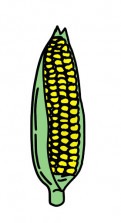
Your baby has grown again to the approximate length of an ear of sweetcorn and weighs about 600g.
Please visit www.nhs.uk/conditions/pregnancy-and-baby/24-weeks-pregnant/ for more information.

Welcome to the third trimester!
Your baby is now approximately the weight of an aubergine; about 1kg and approximately 37cm in length.
Please visit www.nhs.uk/conditions/pregnancy-and-baby/28-weeks-pregnant/ for more information.
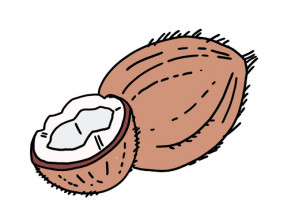
Your baby now weighs approximately the same as a coconut; around 1.5kg.
Please visit www.nhs.uk/conditions/pregnancy-and-baby/32-weeks-pregnant/ for more information.
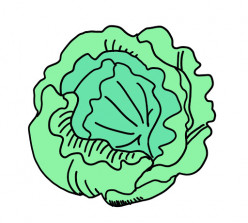
Your baby is now around the same size as a lettuce, approximately 47cm long and weighs around 2.6kg.
Please visit www.nhs.uk/conditions/pregnancy-and-baby/36-weeks-pregnant/ for more information.

Your baby is now the weight of a small watermelon which is approximately 3.3kg and around 50cm in length.
Please visit www.nhs.uk/conditions/pregnancy-and-baby/40-weeks-pregnant/ for more information.